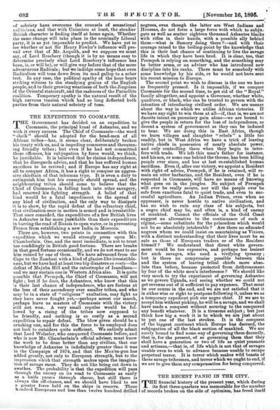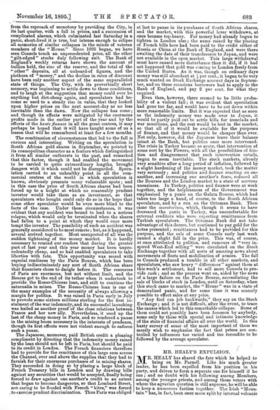THE RECENT PANIC IN IRE CITY. T HE financial history of
the present year, which during its first three-quarters was memorable for the number of records broken on the side of optimism, has freed itself from the reproach of monotony by providing the City, in its last quarter, with a fall in prices and a succession of complicated alarms, which culminated last Saturday in a panic, short-lived it is true, but intense enough to eclipse all memories of similar collapses in the minds of veteran members of the "House." Since 1895 began, we have seen Consols touch an unprecedented. price, all the other "gilt-edged" stocks duly following suit. The Bank of England's weekly returns have shown the amount of bullion held, the size of the reserve, and the total of the " other " deposits, all at unheard-of figures, and the plethora of "money," and the decline in rates of discount have been only another aspect of the same unparalleled state of things. The City, with its proverbially short memory, was beginning to settle down to these conditions, and to laugh at the suggestion that money could ever be anything but dirt-cheap again, and speculators had be- come so used to a steady rise in value, that they looked upon higher prices on the next account-day as no less inevitable than the dawn. Now the collapse has come ; and. though its effects were mitigated by the enormous profits made in the earlier part of the year and by the efforts of the haute finance in all the great centres, it may perhaps be hoped that it will have taught some of us a lesson that will be remembered. at least for a few months.
The combination of circumstances that led to the fall is curious and interesting. Writing on the speculation in South African gold. shares in September, we pointed. to its cosmopolitan character as a feature which distinguished it from all similar outbursts in the past, and. remarked. that this factor, though it had enabled the movement to be carried to quite extraordinary lengths, brought dangers with it which could not be disregarded. Specu- lation carried to an unhealthy point in all the com- mercial centres of the world in which speculation is known, obviously presents many vulnerable spots ; and in this case the price of South African shares had been forced up to a height at which no reasonably prudent investor would take them as an investment, so that speculators who bought could only do so in the hope that some other speculator would be even more blind to the facts of the case. Under these circumstances, it was evident that any accident was bound to lead to a serious relapse, which would only be terminated when the shares had fallen to a point at which they would once more tempt the investor. The possibility of such an accident was generally considered to be most remote ; but, as it happened, several arrived together. Most unexpected of all was the sudden tightening of the money market. It is hardly necessary to remind our readers that during the greater part of last year and this year money has been unpre- cedentedly cheap, and so had enabled speculators to take liberties with fate. This opportunity was seized with especial readiness by the Paris Bourse, which has been buying indiscriminately any sort of South African share that financiers chose to dangle before it. The resources of Paris are enormous, but not without limit, and the Bourse got to the end of its tether when it undertook to provide the Russo-Chinese loan, and still to continue the saturnalia, in mines. The Russo-Cbinese loan is one of the many examples of the necessity of always allowing a margin for politics. It was raised in Paris early in July to provide some sixteen millions sterling for the first in- stalment of the war indemnity, and its successful launching was hailed as another proof of the close relations between France and her new ally. Nevertheless, it used up the last of the cheap money in Paris, and so rendered a pause in the mining boom necessary in the interests of prudence, though its first effects were not violent enough to enforce such a pause.
The Japanese, moreover, paid British credit a pleasing compliment by directing that the indemnity money raised by the loan should not be left in Paris, but should be paid to its credit in London. The French financiers therefore had to provide for the remittance of this large sum across the Channel, over and above the supplies that they had to furnish for their enormous purchases of in mining shares. They succeeded. in doing so by placing a large block of French Treasury bills in London and by drawing bills against any securities that would be accepted, finally being forced to draw against one another's credit to an extent that began to become dangerous, so that Lombard Street, not caring to be flooded with French "kites," was forced. , to exercise prudent discrimination. Thus Paris was obliged at last to pause in its purchases of South African shares, and the market, with this powerful lever withdrawn, at once became top-heavy. For money had already begun to tighten in London also ; the sums raised by the placing of French bills here had. been paid to the credit either of Russia or China at the Bank of England, and were there awaiting the date of their transference to Japan, and were not available in the open market. This large withdrawal must have caused more disturbance than it did, if it had not happened that gold was coming to London freely from the United States. As it was, though on ordinary days money was still abundant at I per cent., it began to be very much wanted on Stock Exchange account days in Septem- ber, and on these occasions borrowers had to apply to the Bank of England, and pay 2 per cent. for what they required.
Even then, however, there seemed to be little proba- bility of a violent fall ; it was evident that speculation had gone too far, and would have to be cut down -within more reasonable limits. But it was expected. that as soon as the indemnity money was made over to Japan, it would be partly paid out to settle bills for ironclads and. war munitions, and the rest would be lent in the market, so that all of it would be available for the purposes of finance, and that money would be cheaper than ever. Not only, however, did. the Japanese leave their balance intact at the Bank, but politics once more intervened. The crisis in Turkey became so acute, that intervention of some sort by the Powers, with all the possibilities of fric- tion and disagreement that such intervention entails, began to seem inevitable. The stock markets, already very sensitive after a long period of inflation, followed by a slight hardening of the money market, took the matter very seriously ; and politics and finance reacting on one another, and increasing one another's fears, reduced all the Bourses and the London market to a state of nervous uneasiness. In Turkey, politics and finance were at work together, and the helplessness of the Government was emphasised by a panic on the Galata Bourse, which had taken too large a hand, of course, in the South African speculation, and by a run on the Ottoman Bank. Then came the moratorium, which, though it seems to have decreased the panic in Turkey, was uncomfortable for external creditors who were expecting remittances from Turkish speculators. The Ottoman Bank did not take advantage of this decree, but continued. to pay gold for the notes presented ; remittances had to be provided for this purpose, and the sale of some Consols early last week caused a slight fall in the price. This was, of course, at once attributed to politics, and rumours of "very in- spired West-End selling" were circulated on the Stock Exchange together with all sorts of amazing news about movements of fleets and mobilisation of armies. The fall in Consols produced a tumble in all other markets, and speculators, who saw heavy " differences" against them at this week's settlement, had to sell more Consols to pro- vide cash ; and so the process went on, aided by the news of a large failure on the Paris Bourse, necessitating the sale of blocks of stock in London, until on Saturday, when this stock came to market, the " House " was in a state of demoralised panic, and for some time it was scarcely possible to effect sales at any price. "Any fool can job backwards," they say on the Stock Exchange ; and it is not difficult, after the event, to trace the causes which led to this remarkable collapse. Some of them could. not possibly have been foreseen by anybody, some only by those with special and intimate knowledge of the state of financial affairs all over the world. In this hasty survey of some of the most important of them we merely wish to emphasise the fact that prices are con- trolled by influences too varied and too recondite to be followed by the average speculator.



















































 Previous page
Previous page